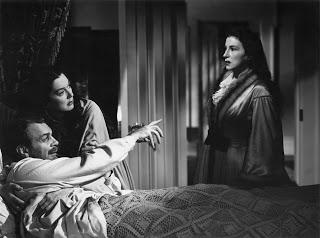 Mourning Becomes Electra (1947) was a colossal boondoggle for RKO, netting Oscar nominations for stars Rosalind Russell and Michael Redgrave but nonexistent box office. It's easy to see why, as writer-director Dudley Nichols (a favored John Ford collaborator) fails to make Eugene O'Neill's massive play remotely cinematic.
Mourning Becomes Electra (1947) was a colossal boondoggle for RKO, netting Oscar nominations for stars Rosalind Russell and Michael Redgrave but nonexistent box office. It's easy to see why, as writer-director Dudley Nichols (a favored John Ford collaborator) fails to make Eugene O'Neill's massive play remotely cinematic. O'Neill's play (nearly six hours in length) updates Aeschylus to Civil War-era New England. General Ezra Mannon (Raymond Massey) is the patriarch of a well-heeled family, loved by his daughter Lavinia (Rosalind Russell) but loathed by wife Christine (Katina Paxinou), who fancies younger sailor Adam Brant (Leo Genn). When Ezra dies suspiciously, Lavinia enlists meek brother Orin (Michael Redgrave) in a revenge plot, murdering Brant and driving their mother mad. But the madness proves congenital, with both Lavinia and Orin psychically scarred by their misdeed.
In a way, Mourning Becomes Electra is admirable in its near-refusal to embrace Hollywood convention. Nichols slashes O'Neill's text in half but the movie still runs a leisurely, talky 173 minutes, with few exterior scenes and rather pedestrian camerawork. Electra prefigures the American Theater adaptations of three decades later, where preserving a literary masterwork is more important than box office. Unfortunately, this movie's much more square and stale than the best of those adaptations.
The best that can be said for Electra is that it preserves O'Neill's twisted, Freud-by-Aeschylus dynamics. Lavinia's pining for her father bears incestuous implications rising far above subtext. It's even more explicit when we meet Orin, a whining Mama's boy who'd rather run off to the South Seas with Christine than face her, but who comes to embody his father's stern, self-destructive gravity as if possessed. There's a neat felicity as Lavinia and Orin swap roles, the former growing flighty and frantic as the latter slips into rigid madness. Friend Peter Niles (Kirk Douglas) tolerates Lavinia's madness but, in true Puritan fashion, balks when he learns she had a fling with a Pacific Islander.
All of this is thematically interesting, but it doesn't make for a good movie. Nichols films in static long and medium shots that leave viewers cold, with the characterizations kept at the wildest, most hysterical level imaginable. This extends to the acting, with Rosalind Russell evolving from a snarling schemer into a ranting madwoman. Michael Redgrave isn't much better, fumbling a New England accent, while Raymond Massey's role amounts to a cameo. Katrina Paxinou makes Christine compelling if not believable. Henry Hull plays an irritating Greek Chorus character who grunts "Ayuh" like an extra in a Stephen King novel.
One respects Dudley Nichols' attempt to keep Mourning Becomes Electra as intact as cinema and the studio system allowed. Unfortunately, it makes for a long, languorous and dull film. Sometimes, when adapting even a brilliant work of literature, it's better to alter the source material than to employ slavish fidelity.

